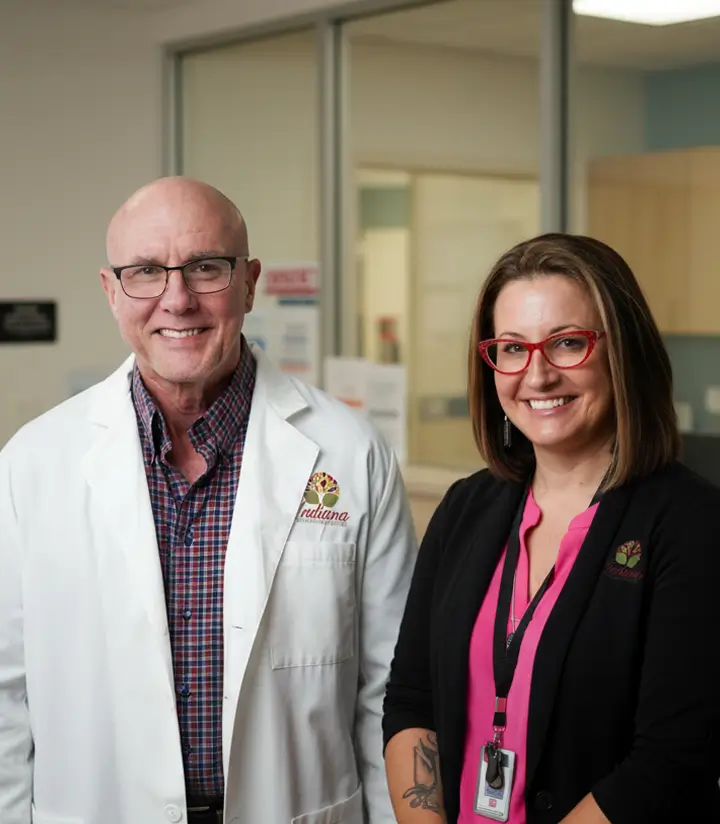
Codependency Counseling: How Can It Help You
Clinically Reviewed by:
When someone you love is struggling with addiction or mental illness, it’s easy to fall into the role of fixer, helper, or caretaker.
You want to protect them. You want them to be okay. You try to keep everything stable. But over time, those efforts can become all-consuming. You start to lose sight of yourself.
But when your needs are always on the back burner, or your peace depends on how they’re doing, you may be caught in codependency—a pattern that quietly chips away at your identity and emotional health.
Recognizing it is the first step toward disrupting unhealthy patterns and creating space for mutual respect and autonomy.
What Is Codependency?
Codependency is when your self-worth becomes tied to meeting someone else’s needs, often at your own expense.
It’s more than just helping or being supportive. It’s when helping becomes compulsive, and when your identity becomes wrapped up in another person’s emotions, behaviors, or recovery.
If someone close to you is dealing with addiction or mental health issues, you may feel responsible for keeping them stable or safe ⓘ. That pressure can lead you into an exhausting loop: the more unstable they become, the more you try to “fix” it, and the more you lose yourself in the process.
At first, this can feel like love or loyalty. But over time, that wears you down and keeps you stuck in a cycle of emotional dependency.
What Causes Codependency?
Codependency often starts with good intentions. You care, you want to help, and you feel responsible for your loved one’s well-being.
Many people who struggle with codependency were shaped by early life experiences that trained them to prioritize others at the expense of themselves. Some common roots of codependency include:
- Growing up in a home where emotional needs were ignored. When your own feelings weren’t acknowledged, you may have learned to suppress them and tune into others instead.
- Believing that love had to be earned through self-sacrifice and service. If love was conditional, based on performance, caretaking, or compliance, you may have learned to associate worth with what you can do for others.
- Living with addiction, trauma, or mental illness in the family. In chaotic or unpredictable environments, children often take on adult responsibilities or become emotional caretakers to cope with instability.
These experiences can shape how you connect with others, making you more likely to take on the “fixer” role in emotionally intense relationships. ⓘ
What Does Codependency Look Like?
Codependency can take many forms, and it doesn’t always look the same from the outside. It can show up in romantic relationships, friendships, sibling dynamics, or even in professional caregiving roles. Some common signs of codependency include:
- Feeling responsible for someone else’s emotions or recovery
- Putting their needs ahead of your own, even when it drains you
- Avoiding conflict or boundaries to keep the peace
- Constant worry and guilt when things go wrong
- Losing touch with your identity, goals, or direction
How Codependency Affects Recovery
If your loved one is dealing with addiction or mental illness, your codependent tendencies can accidentally reinforce the very struggles you’re trying to help them overcome.
Codependency can also prolong a loved one’s struggle by:
- Enabling behavior – Constantly fixing their problems can prevent them from seeing the need for treatment
- Creating emotional dependence – They may rely on you instead of developing coping skills
- Reinforcing denial – Avoiding conflict can keep them from facing reality of their behavior and begin to feel comfortable in an unhealthy status quo
- Stalling growth – Your constant presence of being a “rescuer” can block independence and motivation to change
This doesn’t mean you’ve done something wrong—it means that the dynamic needs to shift so both people can grow.
High-Functioning vs. Low-Functioning Codependency
Not all codependency looks the same. Some people maintain the appearance of being in control while silently carrying the emotional burdens of others.
Others may feel completely overwhelmed, unable to separate their identity from the relationship.
High-functioning codependents seem to have it together. They manage responsibilities, show up to work, take care of daily tasks—but behind the scenes, they’re constantly tending to someone else’s chaos.
They may minimize their own needs, ignore exhaustion, and become hypervigilant caretakers.
Low-functioning codependents, on the other hand, may feel emotionally paralyzed without the relationship. They might:
- Feeling hopeless without the other person
- Avoiding support or isolating yourself
- Needing to help others to feel secure or in control
- Staying in the relationship out of guilt, fear, or obligation
Both forms are emotionally draining and disorienting. They can keep you locked into survival mode, unable to reconnect with your own direction, dreams, or sense of self.
Is Codependency Bad?
Codependency isn’t a character flaw—it’s a learned survival skill, often rooted in past trauma, instability, or emotional neglect. It’s how you adapted to get through difficult situations. But just because it was useful once doesn’t mean it’s healthy now.
Codependency becomes a problem when it disconnects you from your own needs, values, and emotional safety.
When you’re constantly focused on someone else’s struggles, you may stop asking what you want or need. You may forget that you’re allowed to have boundaries, rest, and space to grow.
Recognizing codependency doesn’t mean you’ve failed. It means you’re ready to start healing—for yourself, and for your relationships.
How to Break Codependency
When someone with Alcohol or Opioid Use Disorder begins treatment, detox is often the first step. As they come off substances, they may experience withdrawal symptoms like anxiety, irritability, depression, or confusion.
If you’ve been closely involved in their care, this shift can feel destabilizing. The crisis you were managing fades, and you might experience what is called codependent withdrawal.
You might feel:
- Unsure of your role now that they’re in treatment
- Anxious about stepping back or letting go
- Guilty for focusing on your own needs
- Disconnected from your identity outside caregiving
Counseling can help you navigate this transition and begin building healthier ways of supporting your well-being and your loved one’s recovery.
With therapy, you can:
- Unpack the roots of codependency
- Learn to set boundaries without guilt or fear
- Identify and honor your own values, needs, and goals
- Process emotions like resentment, shame, or anxiety that surface when you let go of control
- Rebuild a sense of self that isn’t defined by crisis or caretaking
Healing doesn’t mean abandoning your loved one—it means learning to support them in a way that’s sustainable and healthy for both of you.
Guidance for Families and Loved Ones
Caring for someone with addiction or mental health struggles affects you, too.
At Indiana Center for Recovery, we understand the toll that caretaking and codependency can take. Our family and partner support programs are designed to help you:
- Understand what codependency is and how it shows up.
- Recognize enabling patterns and shift toward supportive ones.
- Learn how to set clear, compassionate boundaries.
- Stay emotionally connected to your loved one without losing yourself.
As your loved one begins treatment at Indiana Center for Recovery, we work to help you stay connected in a way that supports their recovery and protects your own well-being.
Reach out to Indiana Center for Recovery to learn how our programs support healing for both you and your loved one.
Healthier Support Starts At Indiana Center For Recovery
Codependency counseling helps caregivers break the “fixer” loop described in the article, and Indiana Center for Recovery offers trauma-informed mental health treatment so you can recognize enabling patterns, rebuild self-worth, and support loved ones without losing your own stability.
When emotions are intense or safety is a concern, our structured inpatient treatment program and flexible outpatient therapy services include boundary-setting workshops, communication coaching, and access to dual diagnosis care for families navigating co-occurring disorders.
Specialized family programs and adolescent treatment services guide parents, partners, and teens through codependent withdrawal, helping each person reclaim goals, practice compassionate boundaries, and stay connected while a loved one heals.
Reach teams statewide through our treatment centers across Indiana or call (844) 650-0064 to verify insurance, schedule counseling, and build a recovery plan that protects everyone’s emotional health.






 100% Confidential
100% Confidential
